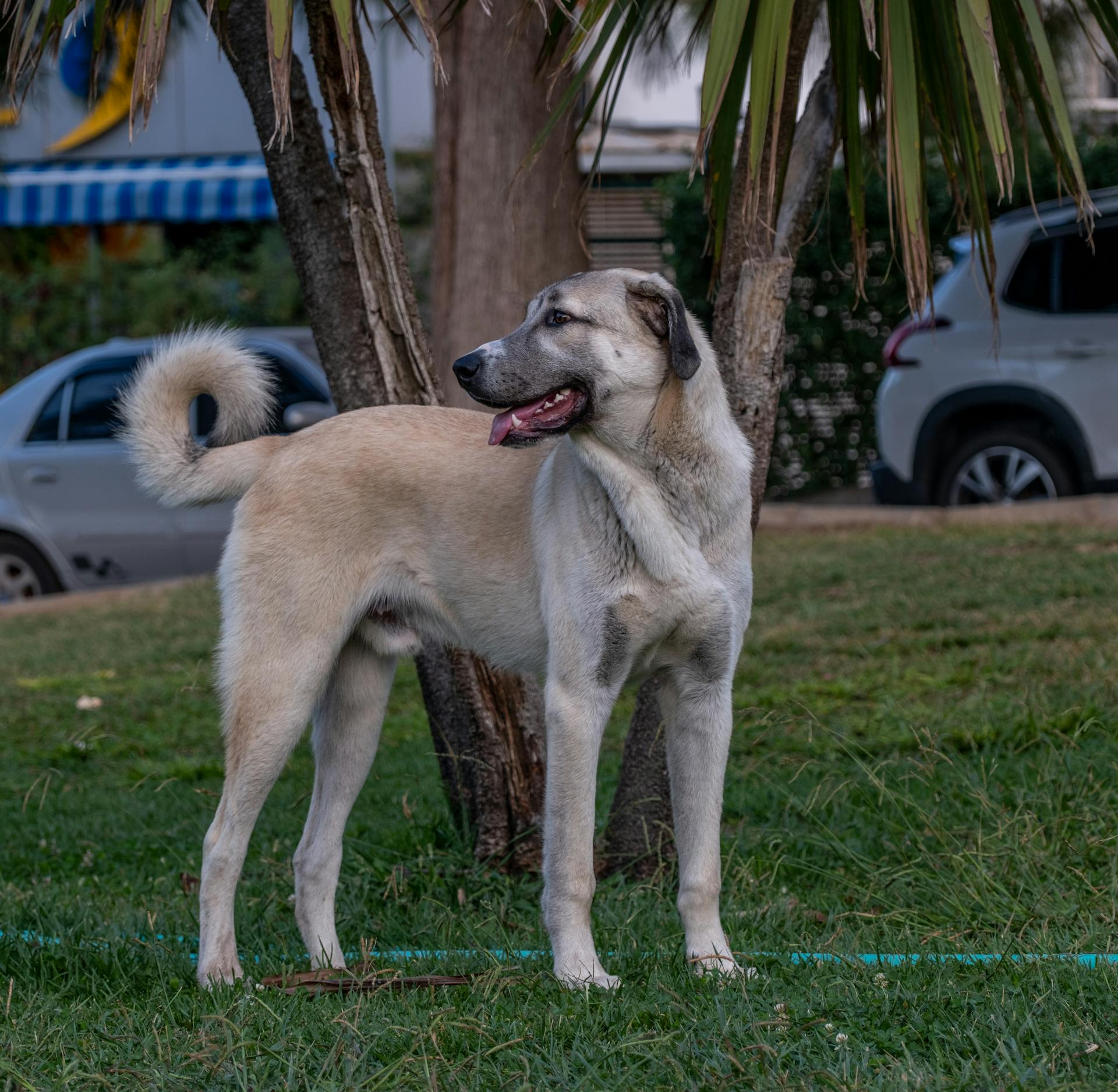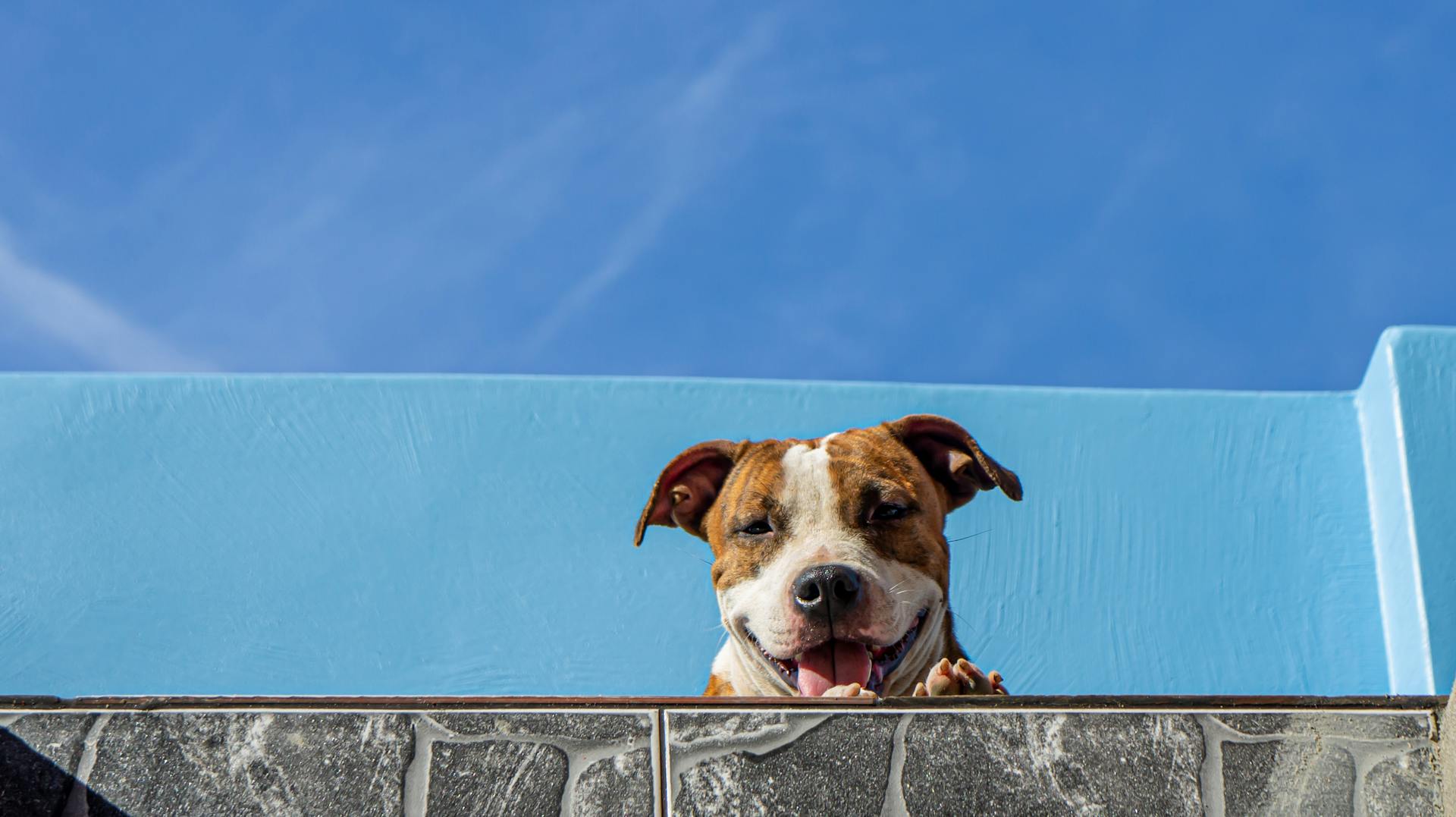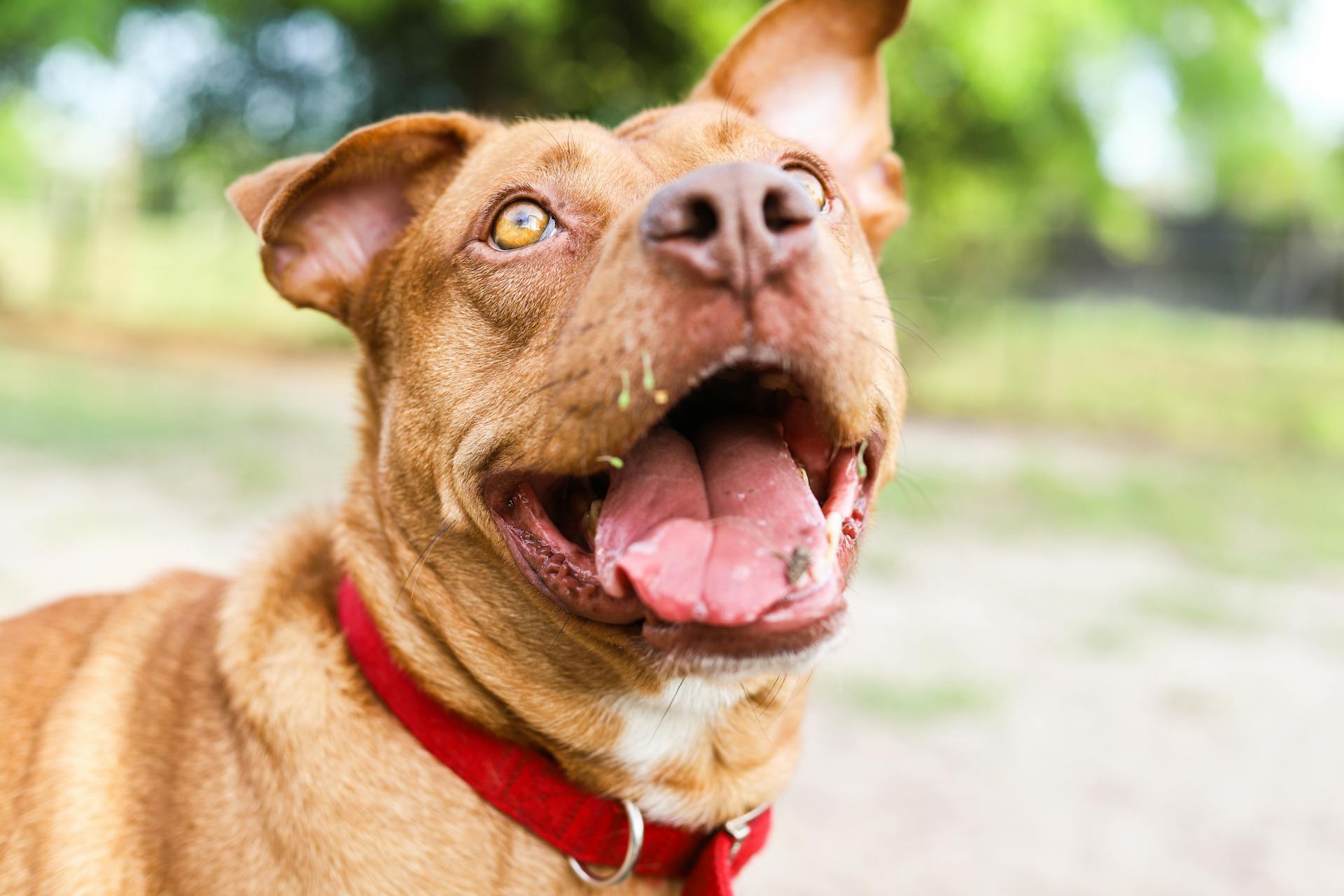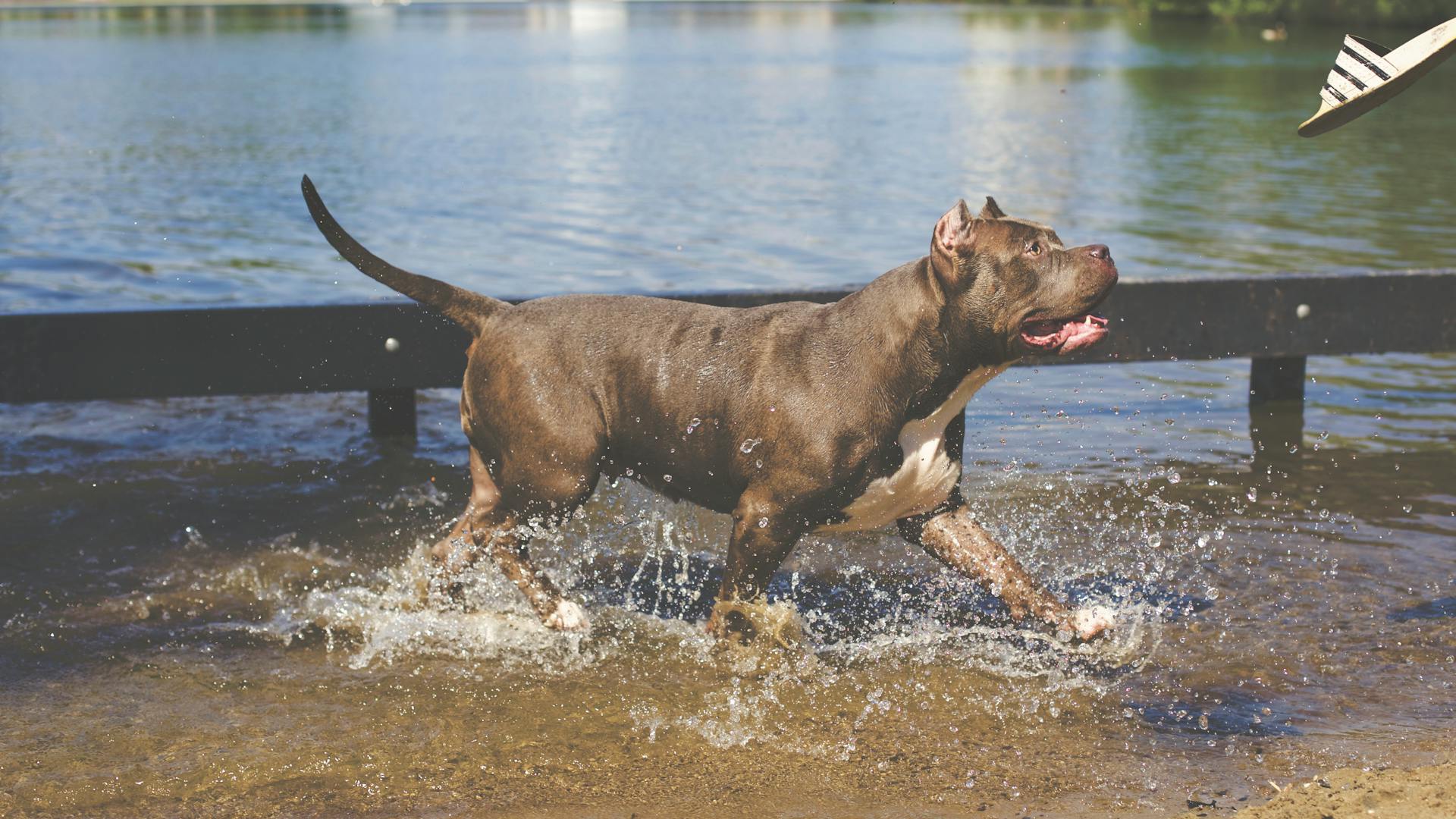
Pitbulls have a long history as loyal companions, with records of their existence dating back to the 19th century in England.
Their original purpose was to hunt and guard livestock, not to fight.
Pitbulls are often misunderstood due to their association with dog fighting, but this is not their natural behavior.
In fact, pitbulls are generally gentle and affectionate with their families, making them great companions for many people.
Bull History and Origins
The origins of pitbulls date back to the early 19th century in the United Kingdom, where they were bred from the Old English Bulldog and the Black and Tan Terrier for the blood sport of dog fighting.
Dog fighting was a popular pastime in 19th century America, and bull-and-terriers were imported from the UK to pursue the sport.
The first pitbull-type dogs were developed in the 1870s, and by the 1890s, breeders were attempting to have their dogs recognized by the American Kennel Club.
However, the AKC rejected these entreaties due to the breed's association with dogfighting, leading breeders to establish the United Kennel Club in 1898.
The UKC recognized the American Pit Bull Terrier as a distinct breed, and its founder, C. Z. Bennett, assigned the breed's first registration number to his own dog, Bennett's Ring.
Bulldogs themselves have a long history, dating back to the 1600s in England, where they were bred for the brutal sport of bull baiting.
In bull baiting, a bull was held in a pit, and the dogs' job was to immobilize the bull by biting it around the head.
The sport was eventually banned, and by the 1930s, the American Kennel Club had recognized the Pit Bull Terrier under a different name, the Staffordshire Terrier, in an effort to distance the breed from its violent past.
Suggestion: Rat Terrier Hunting Dog
Characteristics and Traits
Pitbulls are known for their strength, confidence, and zest for life. They are eager to please and full of enthusiasm, making them excellent family companions.
Their natural agility makes them skilled climbers, so good fencing is a must to prevent escape. However, aggressive behavior towards humans is uncharacteristic of the breed, and they are extremely friendly, even with strangers.
Here are some key characteristics of pitbulls:
Their high level of intelligence and willingness to work make them excel in performance events.
Characteristics
The American Staffordshire terrier, also known as the AmStaff, is a breed that's full of personality. They're affectionate, playful, and energetic, requiring a good deal of exercise to keep them happy.
These dogs are also extremely muscular, weighing between 40 to 70 pounds when fully grown. They have a reputation for being unruffled by pain, thanks to their long history as fighting dogs.
AmStaffs need proper training and socialization, especially if they live with children or other pets, due to their natural drive to hunt prey. They're also known for their guarding and protecting instincts, making them a popular choice for families who want a loyal companion.
Here are some key characteristics of the American Staffordshire terrier:
The American Pit Bull Terrier, or APBT, is a breed that's eager to please and full of enthusiasm. They're known for their love of children and make excellent family companions.
However, APBTs do require careful socialization and obedience training due to their powerful physique and potential for dog aggression. They're also naturally agile, making them excellent canine climbers.
The APBT is not the best choice for a guard dog, as they're extremely friendly, even with strangers. Aggressive behavior toward humans is uncharacteristic of the breed and highly undesirable.
Here's an interesting read: Most Common Police Dogs
General Appearance
The American Pit Bull Terrier is a medium-sized, solidly built dog with smooth, well-defined musculature.
This breed is both powerful and athletic, with a body that's just slightly longer than tall, but bitches may be somewhat longer in body than dogs.
The length of the front leg is approximately equal to one-half of the dog's height at the withers.
Readers also liked: Pitbull Dog Body
The head is of medium length, with a broad, flat skull, and a wide, deep muzzle.
Ears are small to medium in size, high set, and may be natural or cropped.
The relatively short tail is set low, thick at the base and tapers to a point.
The American Pit Bull Terrier comes in all colors and color patterns except merle.
This breed combines strength and athleticism with grace and agility, and should never appear bulky or muscle-bound or fine-boned and rangy.
The APBT must have the functional capability to be a catch dog that can hold, wrestle, and breathe easily while doing its job.
Balance and harmony of all parts are critical components of breed type.
Any disproportionate overdone characteristic that would interfere with physical activity or working ability is a fault.
Unilateral or bilateral cryptorchid and dwarfism are disqualifications.
For another approach, see: American Bully Facts
Teeth
The American Pit Bull Terrier has a complete set of evenly spaced, white teeth meeting in a scissors bite.

A level bite is considered a fault in this breed. Undershot, or overshot bite, is a more serious fault.
Wry mouth is also a serious fault in the American Pit Bull Terrier. Missing teeth can be a serious fault, unless they were lost or removed by a veterinarian.
A complete set of evenly spaced, white teeth is a key characteristic of this breed.
Readers also liked: Pitbull Dog Bite Owner
Forequarters
The forequarters are a crucial part of a dog's anatomy, and it's essential to understand their characteristics to ensure a healthy and well-built dog.
The shoulder blades are long, wide, muscular, and well laid back, forming a strong foundation for the dog's front legs.
The upper arm is roughly equal in length to the shoulder blade and joins it at an apparent right angle, creating a sturdy joint.
The forelegs are strong and muscular, with elbows set close to the body, which is vital for stability and balance.
For another approach, see: Pitbull Strong Dog

Viewed from the front, the forelegs are set moderately wide apart and perpendicular to the ground, indicating good posture and movement.
The pasterns are short, powerful, straight, and flexible, allowing for smooth movement and flexibility.
When viewed in profile, the pasterns are nearly erect, which is a desirable trait in a well-built dog.
Faults in the forequarters can include upright or loaded shoulders, elbows turned outward or tied-in, down at the pasterns, front legs bowed, wrists knuckled over, toeing in or out.
The ideal forequarters are essential for a dog's overall health and movement, and breeders and owners should strive to breed or select dogs with these characteristics.
Tail
The tail is a natural extension of the topline and tapers to a point.
A dog's tail can convey its mood and energy level, carried low when relaxed, level with the backline when moving, and raised when excited.
The tail should never be curled over the back, which is considered a serious fault known as a gay tail.
A long tail that passes beyond the point of the hock is also a fault, but it's not as severe as a kinked tail.
Intriguing read: Pitbull Dog Tail
Liability Insurance
Liability insurance is a crucial consideration for pitbull owners, as they can be held liable for injuries inflicted by their dogs. In the United States, owners are considered liable if they were unreasonably careless in handling or restraining their dog.
Some insurance companies limit their exposure to dog bite liability claims by putting restrictions on dog owners they insure. These restrictions can include refusing to cover dog bites under the policy, increasing insurance rates for homeowners with specific breeds, or requiring owners to take special training.
Homeowners and renters insurance policies typically provide liability coverage from $100,000 to $300,000 for injuries inflicted by dogs. However, some insurance companies may not cover certain breeds, such as pitbull-type dogs, Rottweilers, German Shepherd Dogs, Doberman Pinschers, Akitas, and Chow Chows.
Farmers Insurance, for example, notified policyholders in California that it would no longer cover bites by pit bulls, Rottweilers, and wolf-dog hybrids in 2013. This decision was made after determining that those groups account for more than a quarter of the agency's dog bite claims.
Worth a look: Pitbull Dog Bite
Myths and Controversies
Pitbull guard dogs often get a bad rap, but it's time to set the record straight. Almost 90% of dogs in shelters are misidentified as a particular breed, and even dog experts are usually wrong.
The myth that pitbulls are more aggressive than other dogs is just that - a myth. The American Temperament Test Society found that pitbull terrier-like dogs passed the test at a higher rate than many other dog breeds.
Pitbulls are not physiologically different from any other dog, and there's no such thing as "locking jaws" that make their bites more dangerous. They're just like every other dog - individuals with unique personalities and temperaments.
Despite what some people might say, pitbulls can make great family pets and are even used as therapy dogs and service animals.
Worth a look: Dog Dna Test Pitbull
Are Bulls Dangerous?
Bulls aren't even a topic in the article section facts, but I assume you meant to ask about Pit bulls. Here's the article section:
Pit bulls are actually pretty good with people. The American Temperament Test Society found that pit bull terrier-like dogs passed their temperament test at a higher rate than many other dog breeds.
The idea that pit bulls are more aggressive than other dogs is a myth. In fact, a study published in the April 2022 issue of Science found that dog breed is generally a poor predictor of individual behavior.
Pit bulls don't have locking jaws that make their bites more dangerous. This myth is simply not true - they're physiologically no different from any other dog out there.
Pit bulls can make great family pets. According to Vetstreet.com, the American pit bull terrier is one of the top three favorite breeds in 28 states.
Breed-Specific Legislation (BSL)
Breed-Specific Legislation (BSL) is a complex issue that affects many dog owners and their pets. Breed-specific legislation targets specific breeds of dogs, such as pit bull terriers, and restricts their ownership.
The prejudice against pit bull terrier-like dogs has led to breed bans and other forms of breed-specific legislation, forcing many people to give up their beloved pets. This is unacceptable.
Scientific studies have proven that all pit bull terriers are individuals and are just as safe and gentle as any other dog. This fact is crucial in understanding why breed-specific legislation is unnecessary.
Best Friends is working tirelessly to eliminate breed restrictions and change public perception with facts, statistics, and stories that illustrate the true nature of these loving canines. They're making progress, too.
In America, responsible people should be allowed to love and care for any breed of dog they choose. It's that simple.
Bull Terrier Myths vs Truths
Pit bull terriers are often misunderstood, and it's essential to separate fact from fiction.
Almost 90% of dogs in shelters are visually identified as a particular breed, but this is often inaccurate.
Dog experts are usually wrong when trying to identify a dog's breed, and we often label them with breeds that aren't actually in their genetic makeup.
Additional reading: How Often Should I Bathe My Pitbull Dog
All dogs, regardless of breed, are individuals with unique qualities and deserve a chance at a happy life.
Pit bull terriers are not physiologically different from other dogs and do not have locking jaws that make their bites more dangerous.
The American Temperament Test Society found that pit bull terrier-like dogs passed the temperament test at a higher rate than many other dog breeds.
Dog breed is generally a poor predictor of individual behavior and should not be used to inform decisions about selecting a pet dog.
Pit bull terriers are not reserved for certain types of people; they're family pets, therapy dogs, and service animals, just like other dogs.
Millions of pit bull terriers are in the country, and they're loved and cared for by responsible owners.
Best Friends Animal Society believes that all dogs, regardless of breed, deserve a chance at a happy life and should be treated with kindness and respect.
See what others are reading: Happy Pitbull Dog
Famous Bulls and Rescue
Famous pit bulls have a long and storied history, with many notable individuals having had them as companions. Stubby, a scrappy little stray, became a war dog in World War I and earned the rank of sergeant for his bravery.
Petey, the faithful canine friend to kids on Our Gang, was a pit bull. He's not the only famous pit bull in advertising, as they've been featured on the cover of Life magazine three times.
Pit bulls have been beloved by many, including presidents Teddy Roosevelt and Woodrow Wilson, who had them as companions.
Intriguing read: Dogs in Wwii
Famous Bulls in History and Advertising
Stubby, a scrappy little stray, became a war dog in World War I and earned the rank of sergeant for his acts of bravery, saving his regiment from mustard gas attacks.
Stubby's heroics didn't go unnoticed, and he received a hero's welcome upon his return to America, marching in parades across the country.
Expand your knowledge: Smoky (war Dog)

Petey, the faithful canine friend to kids on Our Gang, was a pit bull and has been featured in advertising for everything from shoes to the U.S. military.
Pit bulls have been featured on the cover of Life magazine three times, more than any other dog.
Presidents Teddy Roosevelt and Woodrow Wilson lived with pit bull terrier companions, showing just how beloved these dogs have been throughout history.
Bull Rescue
Best Friends is a leading organization in pit bull rescue and advocacy, caring for thousands of pit bull-type dogs in shelters across the country.
Their no-kill mission focuses on righting the misconceptions these dogs face, ensuring they get a second chance at a happy life.
Every dog, no matter the breed, is an individual with unique qualities, and pit bulls are no exception, with some being mellow couch potatoes and others being lightning-fast agility dogs.
Many wonderful pit bull terrier-like puppies and dogs languish in shelters, where they often end up being killed instead of getting adopted.
You might like: No Pull Dog Harness for Pitbull
Best Friends has cared for and found homes for thousands of pit bull terriers, including 22 dogs seized from NFL star Michael Vick when he was convicted for dog fighting.
Through their initiatives, staff work tirelessly to ensure that any responsible person who wants to have a pit bull terrier as a family pet is free to do so.
Featured Images: pexels.com


